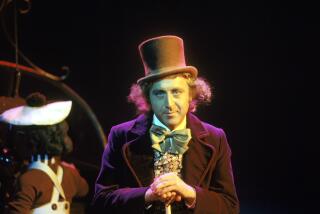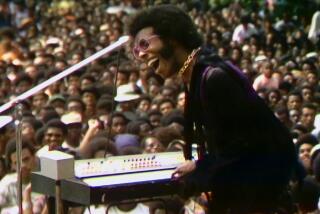From the Archives: Phil Silvers, Sgt. Bilko of TV Fame, Dies
- Share via
Phil Silvers, the one-time vaudevillian and burlesque comic who became world famous on television as a congenial Army con man named Sgt. Ernie Bilko, died Friday afternoon in the Century City apartment where he lived alone.
Tracey Silvers, the eldest of the 73-year-old comedian’s five daughters, said her father was taking a nap and died in his sleep about 1:30 p.m.
“We spoke to him this morning, and he was fine,” she said. “He died naturally.”
Although the Brooklyn-born Silvers suffered a stroke in 1974, his daughter said he was “essentially recovered” and had been active lately, doing telephone interviews with writers in England, where the Bilko series remains popular. She said he had also been going to the Friars Club and to dinner with his daughters.
An interviewer in 1972 quoted Silvers as saying, “I only smile in public. When I’m alone I just sort of stare.”
But Tracey Silvers said that was not true. “He was happy all the time,” she said. “He had a new grandchild, Jaclyn (by his daughter, Nancy), and he took her down to the pool and to the beach—the things any grandfather would do.”
Silvers had been married and divorced twice.
“He loved television,” Tracey Silvers said. “Bilko was the biggest thing in his life, but he loved the theater. He loved live audiences. He loved comedy and the response he got from the audience. Television made him an international star, but it was the theater he loved.”
Silvers, whose bald pate and black, horned-rimmed glasses became his trademarks, appeared in seven Broadway musicals, his biggest hits being “High Button Shoes” in 1947 and “Top Banana” in 1951. He won a Tony award for the latter show, as well as for his performance in another Broadway musical, “A Funny Thing Happened on the Way to the Forum” in 1972.
He also won three Emmys for his Bilko portrayals in the series that began on the CBS network in 1955 as “You’ll Never Get Rich” and later became “The Phil Silvers Show.” He was also nominated for three other Emmys and another Tony.
He appeared in such Hollywood films as “Hit Parade of 1941,” “Tom, Dick and Harry” (1941), “My Gal Sal” and “Footlight Serenade” (both 1942), “Cover Girl” and “Four Jills in a Jeep” (1944) and “40 Pounds of Trouble” and “It’s a Mad Mad Mad Mad World” (both in 1963).
But Silvers once confided that he felt his movie years were wasted.
“When I did work in pictures,” he said, “I always was Blinky, the hero’s good friend, who told the girl, usually Betty Grable, in the last reel that he (the hero) really loves her.”
The comedian was born Philip Silversmith on May 11, 1912, the son of Russian immigrants, in the Brownsville section of Brooklyn. He was the youngest of eight children. By the time he was 11, he was a “breakdown singer” at a Brooklyn movie house, entertaining every time the projector failed.
Two years later, he joined the Gus Edwards School Days Revue vaudeville act, performing at the Palace Theater in New York City. He toured with the Edwards troupe for three years, until his voice changed, then spent five years touring the vaudeville circuit with the team of Morris and Campbell.
Vaudeville was dying, so Silvers earned a living making two-reel movies at $150 apiece and doing improvisations in nightclubs and on the “borscht belt” in the Catskills.
In 1934, Silvers went with the famous Minsky burlesque troupe, touring from theater to theater all over the country for five years and advancing from “third banana” to “top banana.” It was then that he adopted the horn-rimmed glasses to give himself some style.
He left burlesque in 1939 to take the lead in a musical, “Yokel Boy.” The show flopped, but Silvers was given a $500-a-week contract by Metro-Goldwyn-Mayer and went to Hollywood. Although MGM allowed his contract to lapse, he got a part in “The Hit Parade” and went on to appear in 23 films for 20th Century Fox by 1945.
After a 1945 USO tour in the Mediterranean area with Frank Sinatra, Silvers returned to nightclubs and then to Broadway—this time in the 1947 smash hit, “High Button Shoes.”
Then came “Top Banana” and, eventually, the amiable swindler named Bilko in the TV series.
Despite what Bilko did to make him famous, Silvers at times apparently felt trapped by the role. When he was making a hit on Broadway in a revival of “A Funny Thing Happened on the Way to the Forum” in 1972, Silvers complained, “I’ll always be Bilko. Here I am, in one of the biggest hits of my career, and . . . people on the streets yell, ‘Hi, sarge!’ ”
Witness Stand
One appearance that Silvers did not relish was on a Los Angeles federal court witness stand in 1968, when he testified in the trial of five men accused of conspiring to cheat him and other Friars Club members in rigged card games. He said he had lost thousands of dollars and conceded: “Gambling just engulfed me. I just gambled to gamble. I’ve been gambling all my life.”
In 1945, he married Jo Carroll Dennison, the 1942 Miss America. They were divorced five years later. Silvers married television actress Evelyn Patrick in 1956. That marriage produced the five daughters and ended in divorce in 1966.
Silvers published an autobiography, “The Laugh Is on Me,” in 1973.
In 1975, Silvers was interviewed by Los Angeles Times writer Lee Grant in his apartment, where he was recovering from the stroke a year before. He was surrounded by photographs of his daughters—Tracey, Nancy, Laury, Cathy and Candy (the last two twins).
Wildly Popular
He spoke fondly then of the Bilko series, noting that the reruns were wildly popular in Europe—more so than in the United States.
“I go to Italy, and they follow me around and sing under my hotel window,” Silvers said.
And he said wistfully, “I’d like to be back in TV now. I need the occupation. Something to do every day.”
Tracey Silvers, who said her father’s funeral will be private, recalled:
“My dad told me comedy is no laughing matter. To be very funny, you have to be very serious about it. I’ve never forgotten that. He really was a genius. He was funny till the last minute. He always had a joke for every situation. He was a funny guy.
“He’s smiling right now.”
From the Archives: Gene Kelly Dies; Legendary Dancer Was 83
From the Archives: Beat Generation’s Jack Kerouac Dies at 47
From the Archives: Sarah Vaughan, ‘Divine One’ of Jazz, Dies at 66
From the Archives: Simon Wiesenthal dies at 96; Nazi hunter loyal to the dead
From the Archives: Spencer Tracy, 67, Dies After Screen Career of 37 Years
More to Read
Start your day right
Sign up for Essential California for the L.A. Times biggest news, features and recommendations in your inbox six days a week.
You may occasionally receive promotional content from the Los Angeles Times.







